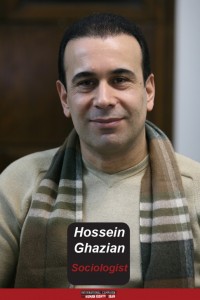Commentary: Rouhani’s Silent Allies

Hossein Ghazian, a sociologist and researcher of Iranian politics, gender, and culture, specializes in social gauging and measurement, and specifically in surveys. Dr. Ghazian has also been a journalist for more than 20 years. He has authored several books and has published numerous articles on sociology and Iran. This is one of a series of articles by Dr. Ghazian published by the International Campaign for Human Rights in Iran, focusing on themes of human rights and sociology, and analyzing policies related to these subjects.
Commentary: Just recently, President Rouhani angrily lashed out at the opponents of the nuclear agreement. “Why is the University silent? Why must we [only] hear from some illiterates who are being paid by certain circles?” he asked.
The president’s attempt to embolden his fans did not have the impact he was hoping for. The educated class did not break the silence. Instead, the comments angered “illiterates” who thought they were the subject of his ridicule.
The commander of the Revolutionary Guards retorted that the Iranian intelligentsia “simply regurgitates” Western ideas. “They only say big words and our universities treat them as if they are based on science. If anyone is not equipped with those words, they say, ‘He isn’t scientific.'”
Why are supporters of the Geneva Agreement reluctant to embrace the President’s call to voice their views? Why have “illiterate opponents” been able to dominate the nuclear debate?
Both regimes, before and after the 1979 Revolution, have expected their supporters to be more vocal. This expectation was based on a wrong understanding of freedom and free speech.
Faced with waves of opposition, Mohammad Reza Pahlavi was shocked that those who benefited from his reign were not speaking out or taking action in his support. He felt terribly alone in the turbulent days of the Revolution.
Those who have ruled the country since the Revolution have also felt unsupported. The backing they have received from the regime’s benefactors has not been on the level they expected.
Ayatollah Khamenei has always complained of the “unwise elite” who refuse to back him. His followers have frequently claimed that the Supreme Leader is single-handedly carrying the weight that should be shared with the so-called silent elite.
Now President Rouhani is calling on his benefactors, this silent elite, the academic and intellectual community, to step forward and show support for the nuclear pact. But all he is hearing is silence still.
What the country’s rulers have failed to understand is the connection between intellect and credibility and freedom of speech. The educated elite step into public debates with a sense of credibility. That credibility can only be maintained if there is enough space for an open public debate.
The educated class does not want to become a political football in the heat of the moment and then be discarded and forgotten. They want to be respected for their supportive views and tolerated for their criticism as well. If they sense that they are being used as pawns for certain political ends then naturally they will not play along. They will prefer silence.
This is the key point which the monarchic dictatorship and the despotic theocracy have failed to grasp.
Nevertheless, Mr. Rouhani should be smart enough to realize that he can only expect expressions of support when opponents can speak out as well. Freedom of speech and public discussion require fluidity and pluralism. They cannot flourish artificially, with authorized individuals discussing certain hand-picked subjects.
You cannot open up the society to discuss only one subject. You cannot start a free debate on the nuclear conflict and ban hundreds of other important topics.
Even regarding the nuclear issue, since the very beginning, there has been no room for discussion and debate. Therefore it should not be surprising that at this point the true supporters of the Geneva Agreement are not willing to stand up to “paid” opponents.
The educated class realize that if they side with the Rouhani Administration they will not only be seen as mercenaries but also risk retribution in the current climate of insecurity. Rouhani has not been able to create a relatively secure environment even for his supporters.
Instead of protecting newspapers, the National Security Council has repeatedly and illegally placed limitations on the media. It also seeks to file complaints against opponents within the ruling establishment who are doing journalistic work on the nuclear issue.
If not hopeless, the President’s own attitude towards the media has not been encouraging either. Like all politicians who do not like to be cornered or criticized, Rouhani tried to pick his own favorite presenter for an interview on state TV and has shunned questions from what is left of the independent press.
Shortly after the closure of Bahar newspaper (which supported Rouhani’s presidential campaign), the country’s existing semi-independent press has suffered another blow with the shutdown of Aseman—a newspaper which was proudly carrying Rouhani’s banner.
If the President is not able to provide security for the supporters of the nuclear deal, if he cannot prevent censorship against his media allies, how can the “educated” break their silence?






